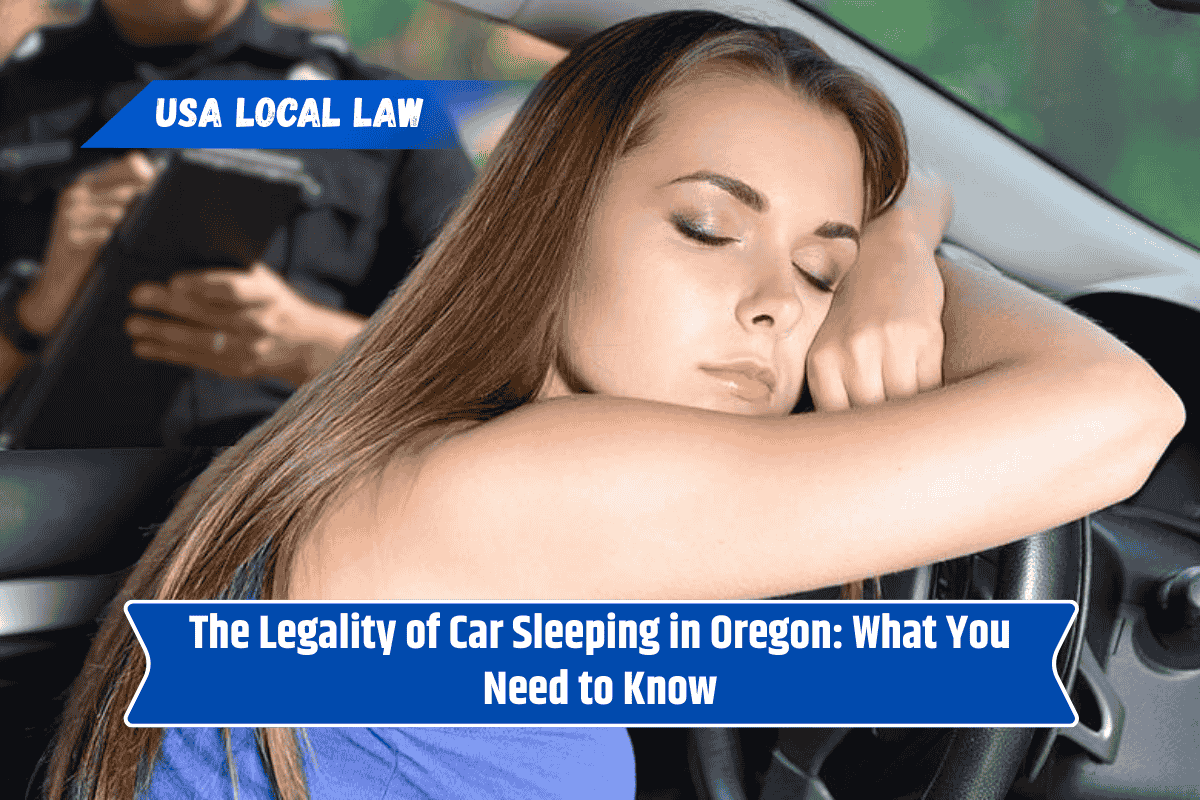In Oregon, like many other states, people often turn to their vehicles as a place to rest while traveling, camping, or even in cases of homelessness. While sleeping in your car can seem like a simple solution, there are legal considerations that vary by location.
In Oregon, the legality of car sleeping depends on several factors, including where you park, local laws, and whether you are on private or public property. Here’s everything you need to know about car sleeping in Oregon.
1. Is Sleeping in Your Car Legal in Oregon?
In general, Oregon does not have a statewide law specifically prohibiting sleeping in your car. However, local municipalities have their own rules and regulations that could make car sleeping illegal in certain areas.
The legality often depends on whether you are parked on public or private property and whether you are breaking any local ordinances.
For example, you may be able to sleep in your car in rural or less populated areas, but in urban areas, such as Portland or Eugene, city ordinances may ban car sleeping in certain areas, especially if the vehicle is parked overnight.
2. City-Specific Ordinances on Car Sleeping
Many cities in Oregon, especially those with larger populations, have passed ordinances that restrict or ban sleeping in cars in public areas. Here are some key examples:
Portland: In Portland, sleeping in your car on public streets is not allowed unless you are in an area where it is explicitly permitted, such as certain parking lots or campgrounds.
The city also has a program called the “Safe Sleep” initiative, which allows homeless individuals to sleep in their cars in designated areas with security and resources. Be aware that parking enforcement may ticket or tow vehicles parked illegally for overnight stays.
Eugene: Eugene also has restrictions on car sleeping in public spaces. The city has made efforts to balance the rights of homeless individuals with the need for safe public spaces.
Similar to Portland, some designated areas may allow overnight car parking, but you should always check with local authorities for current policies.
Bend: Bend does not have an outright ban on sleeping in vehicles, but like other cities, certain parking regulations or local ordinances may limit where and when this can happen. There may also be designated areas for overnight parking, especially for tourists or RVs.
3. Sleeping in Your Car on Private Property
If you are on private property, such as in a friend’s driveway or at a campground, you generally do not need to worry about local ordinances, as long as you have the property owner’s permission.
Many private campgrounds and RV parks in Oregon offer overnight parking for people sleeping in their cars, especially those traveling on road trips.
However, if you’re staying on private property without the owner’s permission, it could be considered trespassing, and you may be asked to leave. In these cases, local police or security could intervene.
4. Homelessness and Sleeping in Cars
One of the most pressing issues around sleeping in cars in Oregon is homelessness. With an increasing number of people experiencing homelessness in cities like Portland, some local governments have developed initiatives to allow car sleeping in designated areas.
These areas often provide safety, hygiene facilities, and the opportunity to connect with local social services.
Programs like Portland’s “Safe Sleep” areas aim to reduce the risks associated with people sleeping in their cars, such as vehicle break-ins or confrontations with the police. These designated areas are designed to offer temporary relief for those without permanent housing.
5. Parking Regulations and Enforcement
Even if sleeping in your car is legal in a given area, you still need to comply with local parking regulations. For instance:
Overnight parking bans: Many areas have specific ordinances that prohibit parking between certain hours, which could apply to car sleeping.
Street cleaning: Some cities schedule street cleaning, which could result in fines for vehicles parked in the cleaning zone during designated hours.
Time limits: In some areas, there may be time restrictions on how long you can park in one spot, even if you are not sleeping in your car.
6. Safety and Precautions
While sleeping in your car can be convenient, it’s important to prioritize your safety. Here are some tips:
Choose safe, well-lit areas: Always try to park in areas where there is some visibility and safety, such as well-lit parking lots or rest stops.
Avoid high-crime areas: Research the area you plan to park in to ensure it is safe.
Keep windows slightly cracked: While you may want to keep your car secure, allowing some ventilation can help keep the air fresh inside the vehicle.
Lock your doors: Always lock your car to protect yourself and your belongings.
Use public spaces: If you’re staying in a city, consider using paid parking lots or designated campgrounds where overnight stays are permitted.
7. What to Do If You Receive a Ticket or Citation
If you do receive a ticket or citation for sleeping in your car, there are a few steps you can take:
Understand the citation: Carefully read the ticket to ensure you understand the reason you were cited. It may be for violating local ordinances, such as parking too long in one spot or parking in a restricted area.
Appeal: In some cases, you can contest the citation in court, especially if you believe the ticket was issued in error or under circumstances you can explain.
Sleeping in your car in Oregon is not illegal in all cases, but there are local laws and regulations that you must follow. Before settling in for the night, it’s important to be aware of the rules in the area where you are parking.
Local city ordinances, safety concerns, and parking restrictions are all factors to consider. For those experiencing homelessness, certain cities offer resources like designated safe sleeping areas to help make car sleeping a more secure option.
